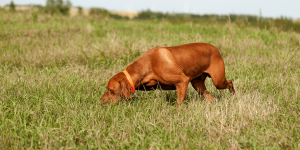Sniffer Dogs and the Illegal Wildlife Trade.
The illegal wildlife trade is one of the main causes for a species becoming endangered. It can undo years of conservation efforts in an alarmingly short time span. Holidays4Dogs looks into the valuable contribution sniffer dogs make, in efforts to eradicate the illegal wildlife trade and the protection of biodiversity.
There have been numerous efforts from various countries to strengthen bans on the import and sale of illegal wildlife products, such as ivory. However, according to the World Wildlife Fund, illegal wildlife trading is a multi million pound business. The future of many species of animals depends on the combined efforts of governments, law-enforcement agencies and sniffer dogs.
the combined efforts of governments, law-enforcement agencies and sniffer dogs.
How effective are sniffer dogs?
A dog’s sense of smell is far superior to our own. Dogs learn about the world around them, primarily through their sense of smell.
The specific features of their olfaction means they can detect, with outstanding accuracy, anything from human diseases, to illegal contraband.
This makes their services invaluable in a variety of different fields, including endeavours to curb the illegal wildlife trade.
Where do sniffer dogs work?
Sniffer dogs work with law-enforcement agencies the world over. They work in national parks, shipping ports, airports and other transportation depots.
 The dogs make a very significant impact by detecting various substances. They also help deter poachers and raise public awareness about the illegal wildlife trade.
The dogs make a very significant impact by detecting various substances. They also help deter poachers and raise public awareness about the illegal wildlife trade.
According to TRAFFIC, the Wildlife Trade Monitoring Network, poaching of Rhino horn for example, was at an all time high in 2011 and a total of 448 Rhinos were killed in South Africa.
TRAFFIC, (Wildlife Trade Monitoring Network), has been operating since 1976 and works collaboratively with the WWF, (World Wildlife Fund) and the IUCN (International Union for Conservation of Nature).
Together, they ensure that the illegal trade in animals, (and plants ) is not a threat to conservation projects.
In addition, TRAFFIC actively supports CITES – the Convention on International Trade in Endangered Species – and has assisted with the development of an international wildlife treaty.
Sniffer dog training.
Sniffer dogs are trained using motivational training to reinforce positive behaviour. Training in this way really hones a dog’s scent detection skills.
Most importantly they can be trained to look for specific items of contraband.
What sort of scents can sniffer dogs detect?
In one of its latest projects, TRAFFIC teamed up with WWF and the Kenyan Wildlife Service to train sniffer dogs to help crack down on its illegal ivory trade. The scheme to train these specialised dogs, developed a new way of operating which is less time consuming, and easier for the dogs.
trade. The scheme to train these specialised dogs, developed a new way of operating which is less time consuming, and easier for the dogs.
The authorities use specialised equipment to take a sample of air from cargo containers. A filter collects scent for the dogs to sniff.
Therefore, the dogs don’t have to scent through a whole cargo container. Instead, they can work in comfortable, climate-controlled rooms. This is particularly important for the welfare of dogs working in the hotter climates, such as Africa and India.
Conclusion.
New training schemes such as these provide significant advances in terms of detecting a greater number of illegal attempts at trading wildlife products. The WWF hope that this project will help further raise awareness of the illegal wildlife trade.
It is imperative that global leaders work together to help stop the trade of illegal wildlife and ultimately to stop the threat of extinction, which so many species are facing.


